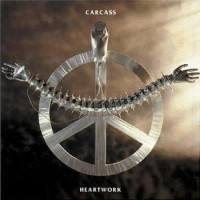Time always alters perspective. In his retrospective on death metal and grindcore, Choosing Death, author and future Decibel overlord Albert Mudrian wrote about how death metal almost, nearly, but not quite gained mainstream acceptance in the '90s. Tape trading and word of mouth in the '80s helped plenty of these extreme metal bands put up big numbers, and eventually major labels came calling post-Nirvana. It was a business venture that didn't pan out, but it did lead to some interesting art. Case in point: Heartwork by Carcass.
Carcass had mostly completed Heartwork by the time their label Earache secured distribution through Columbia, but even so, the album still carries a distinct shift while still obliterating faces. Compared to their previous album, 1991's Necroticism - Descanting the Insalubrious, Carcass favored shorter song lengths, and even slow things to sub-grind speeds for the occasional epic guitar solo. Vocalist/bassist Jeff Walker later told Decibel that the record's biggest influences were Nirvana's Nevermind and Metallica's "Black Album."
This album did not sit well with grindcore fans or the mainstream.
Which, OK, trapped Heartwork at the time in a no-win scenario: still too extreme for the masses, but too populist for the underground. But while Heartwork failed to hit those oh so giant numbers Columbia hoped for (indeed, none of the Earache bands had much success here), it still resonated with the people who did buy it.
Death metal's greatness generally comes from obliterating the senses. Heartwork does that, but it also had a groove to it that other metal bands from the era lacked. Even the mighty Metallica, whose influence can be most felt on the solos in tracks like "Buried Dreams" and "No Love Lost," could be too rigid at times. But when you put on "This Mortal Coil," there's a whole cache of rhythms going on, from a grinding intro to a galloping Iron Maiden-esque passage to a badass halftime segue into the verse. It's easy to take this kind of dynamism for granted in light of bands like Between the Buried and Me and Dillinger Escape Plan, but Carcass came from an era where melody was abhorred. You could actually dance to these songs if you weren't so busy thrashing, and that freaked a lot of people out.
That is what makes Heartwork so relevant today. For all the crap Carcass took at the time for "selling out," they ended up producing a record that stands way above most of the metal that came out in 1993. Heartwork is still a brutal album. Walker sounds as demonic as ever. The guitars are huge; the drums obliterate. Shit gets heavy, it just also sidesteps any masturbatory prog aspirations along the way. Coming in at a tight 42 minutes, Heartwork might arguably be the best Carcass record, because instead of avoiding melody and groove, it subverts those things to metal's cause.
